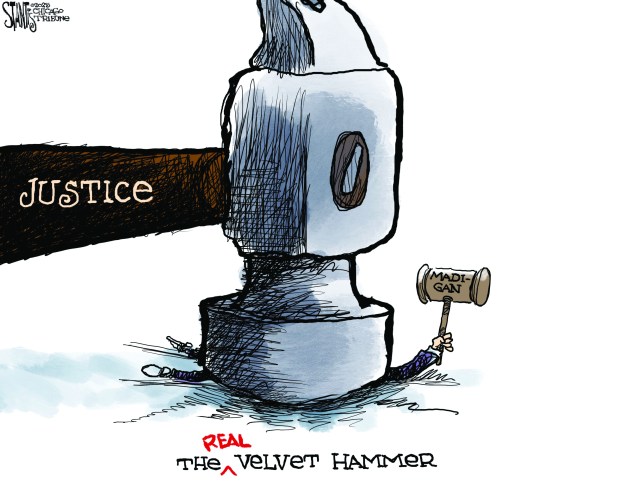We’ve been here before. Dwelling in this purgatory inhabited by heartbreak. Only days past hope, we stare ahead at years of despair.
The Champagne my husband and I planned to drink with our daughter is back in the refrigerator. The handkerchief we shared at a Nov. 6 church service is laundered. Our Kamala Harris T-shirts have joined the Elizabeth Warrens and Hillary Clintons in the bottom drawer.
Second-wave feminists are weary. We protested for the Equal Rights Amendment, rallied for abortion rights, argued for equal pay, joined women’s marches, raised third-wave activists, knocked on doors and donated money.
The female-symbol tattoo obtained after Donald Trump’s first election no longer serves as a talisman of hope. It has faded along with our dreams of living to see a woman elected president.
After the election, the autopsy results came in fast. We read the analysts, listened to the pundits, but found their condemnations lacking. We don’t blame Harris’ defeat on President Joe Biden’s late exit, the lack of an open Democratic primary, the economy, immigration, the war in Gaza, legacy media or perceived liberal elitism. We certainly don’t accuse Harris, who in 107 days turned around the Democratic ticket’s approval ratings, raised record donations and tirelessly campaigned wearing heels and Chuck Taylor sneakers.
No, she lost because our country fosters institutional misogyny and toxic masculinity.
When Trump ran against a man, he lost. But when his opponents were women, he won. This man, accused of sexual assault by dozens of women, said at a Wisconsin rally that “whether the women like it or not, I’m going to protect them.” An ironic statement from someone women actually need protection from.
Through both campaigns, Trump defiled Harris and other women of political prominence with name-calling and threats of violence. Trump intentionally mispronounced her name as “Kuhmala,” said she lacked intelligence and questioned her race. He called Nikki Haley, the daughter of immigrants from India, “Nimrata.” He suggested rifles be trained on former Republican U.S. Rep. Liz Cheney’s face. Former House Speaker Nancy Pelosi is “an evil, sick, crazy b—-” and Hillary Clinton “a skank” and a “crook,” according to Trump, a convicted felon.
Following the bro playbook, JD Vance referred to Harris as “trash” and said female leaders were “a bunch of childless cat ladies.”
If Trump and Vance were in middle school, they would have been suspended. Instead, defaming and maligning women got them elected to the nation’s highest offices.
We are weary of being reminded to view history’s long arc, that progress is not linear. Susan B. Anthony, days before she died, told suffragists that failure was impossible. Tragically, she never got to vote legally, although she was arrested for trying.
Shirley Chisholm, the first African American woman in Congress and the first to seek the presidency, said she faced a double handicap. “Of my two handicaps, being female put many more obstacles in my path than being Black,” she said.
Decades later, Barack Obama overcame racism to serve two terms. Harris with her double handicap could not scale those two obstacles.
Trump’s campaign of grievances overwhelmed her message of joy and compassion.
Harris’ graceful concession speech called on us to continue to fight for justice and ourselves. “I know many people feel like we are entering a dark time, but for the benefit of us all I hope that is not the case. But here’s the thing, America: If it is, let us fill the sky with the light of a brilliant, brilliant billions of stars. The light of optimism, of faith, of truth and service.”
Today, many of us look up at the stars and see glistening tears. Maybe our wounds will be cauterized and our crying will subside by Inauguration Day, also the Rev. Martin Luther King Jr. holiday when we had expected a radiant Black woman to take office.
Like Harris, others urge us to move forward, to stay vigilant and keep fighting for democracy. But the anguish, grief and rage cut much deeper this time. We are tired of the struggle, and some of us are running out of time. Failure is indeed possible.
It’s time to pass the baton. It will be up to the daughters we raised on “Free to Be…You and Me” and the granddaughters to whom we read “Nevertheless, She Persisted” at bedtime. It is their turn to march and carry the signs. Perhaps during their lifetimes, they will see a woman elected president of the United States.
We can only pray they succeed in finally shattering that ultimate glass ceiling and that they bask in the light of billions of stars. Maybe we will live long enough to experience it, too.
Christine Ledbetter is a former senior arts editor at The Washington Post who lives in Illinois, where she writes about culture and politics.
Submit a letter, of no more than 400 words, to the editor here or email letters@chicagotribune.com.



